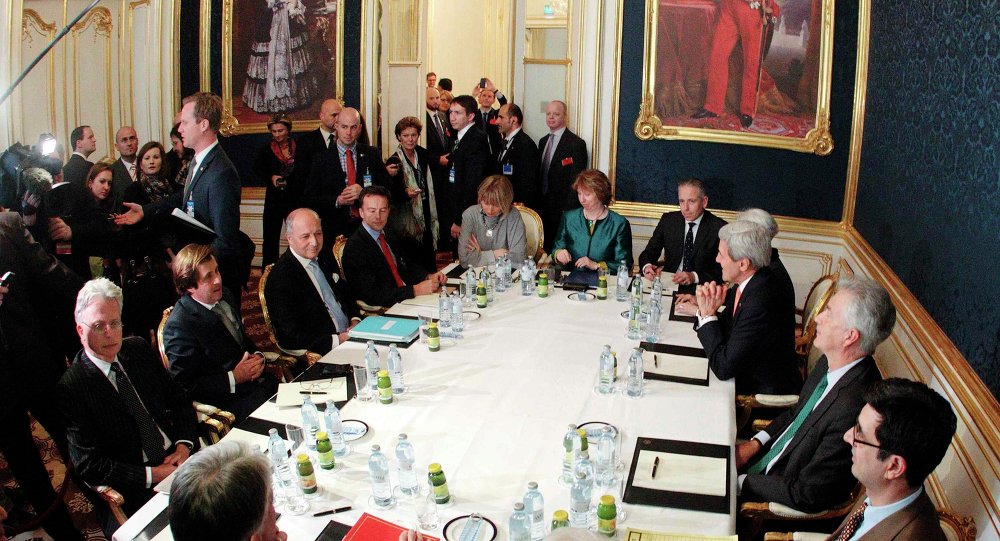 Negotiators in Vienna missed today's deadline for a nuclear agreement. Some observers have expressed concern over the length of the extension announced today to reach a deal.
Negotiators in Vienna missed today's deadline for a nuclear agreement. Some observers have expressed concern over the length of the extension announced today to reach a deal.VIENNA ��Iran�and six world powers today pushed back by seven months their own deadline for reaching a nuclear accord, increasing the risk that anti-deal hardliners in Washington or Tehran could jeopardize a final agreement.
Foreign ministers from Iran and the so-called P5+1 group (US, Russia, China, Britain, France, and Germany) agreed to resume talks next month, with the aim of reaching a political framework by next March and a final deal by July.
�Progress was indeed made on some of the most vexing challenges we face, and we now see the path toward potentially resolving some issues that have been intractable,��US Secretary of State John Kerry�said after the talks.
The US and world powers had �earned the benefit of the doubt� for more time, Mr. Kerry said, because the world was a �safer place� after Iran froze and rolled back parts of its nuclear program, under the interim deal agreed with Iran a year ago.
�We are certainly not going to sit at the negotiating table forever, absent measurable progress,� said Kerry. �But given how far we have come over the past year, particularly in the last few days, this is certainly not the time to get up and walk away.�
The fundamental challenge has been finding a mutually acceptable balance between limiting Iran�s nuclear program so it could never produce a weapon, and easing sanctions that have crippled Iran�s economy.
Still, after 2-� years of increasingly frenetic diplomacy ��and expectations that the political cost of a second extension this year would be too high for all sides � there was surprise and concern over the length of the extension.
�I fear the longer it takes, it gives critics of a deal more time to sabotage the important progress that has been made to date,� says Kelsey Davenport, the nonproliferation analyst for the Washington-based�Arms Control Association, who monitored the talks in Vienna.
�The negotiators need to remain focused on the remaining gaps and reach a deal as soon as possible,� says Ms. Davenport. �It was by no means completed, but the P5+1 was looking for ways to meet their breakout goals, and allow Iran to maintain a significant uranium enrichment infrastructure.�
British Foreign Secretary Philip Hammond said Iran and the P5+1 �made some significant progress,� but that negotiators �had to conclude it is not possible� to complete the deal by today�s deadline.
Foreign ministers spoke of �new proposals� on the table, but it was not clear what those were, or how they would change the matrix of complex negotiations. The extension effectively continues the Joint Plan of Action � an interim agreement reached in Geneva a year ago, in which Iran froze its most sensitive nuclear work in exchange for a partial easing of sanctions.
As part of the rollover, Iran would continue to receive $700 million per month in sanctions relief, while maintaining the established freeze on advanced nuclear work.
Rising highest among a host of interrelated issues, from the size of Iran's enriched uranium stockpile to the efficiency of advanced centrifuge designs, is the question of how many of Iran�s 19,000 centrifuges it will be able to keep in a final deal. Of those installed, only about half of them are currently running.
Nonproliferation experts say the issue is more atmospheric than technical,�with compromise numbers between 4,000 to 8,000 being discussed.
�There are still gaps on the centrifuge [numbers],� says Davenport of the ACA.
�Centrifuges have become symbolic of the deal�s success. I don�t think those gaps have a technical basis, so much as a political symbolism, which� has made it difficult for both sides to move forward,� says Davenport. �They have boxed themselves in by an issue unwarranted by proliferation concerns.�
This article was written by��Scott Peterson for The Christian Science Monitor on NOV. 24, 2014. Scott Peterson covers the Middle East for the Monitor from Istanbul, Turkey, with a special focus on Iran, Iraq, and Syria.
The Iran Project is not responsible for the content of quoted articles.










